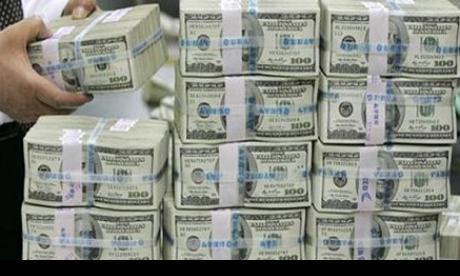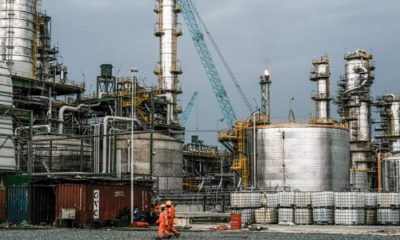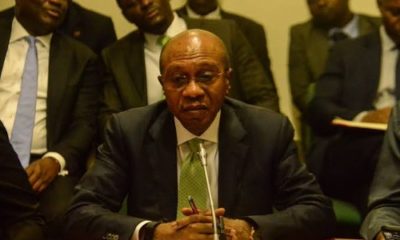Finance
CBN assures Dangote refinery of dollar supply despite forex decline

LAGOS — REFINERIES may have assumed a first-line charge in Nigeria as the Central Bank of Nigeria, CBN, said that it would assist the Dangote Group to access foreign exchange to facilitate its 14 billion dollar refinery project inspite of the current decline in foreign exchange been faced by the country.
Mr Godwin Emefiele, the Governor of the CBN, said this during a tour of the refinery which is projected to refine 650,000 barrels of crude oil per day.
The tour of the facility held on Sunday at its location within the Lekki Free Trade Zone in Lagos.
The CBN governor said that the support was to ease the importation of equipment needed to bring the Dangote refinery to reality.
 “Your ongoing 14 billion dollar refinery investment will enjoy our support, no doubt.
“Your ongoing 14 billion dollar refinery investment will enjoy our support, no doubt.
“We are doing this to fast-track the importation of equipment you need for a speedy completion of that project and to encourage other Nigerians to follow your lead,’’ Emefiele said.
According to him, the tour is necessary to lend our support to this laudable project that will transform Nigeria’s downstream oil sector.
“The Dangote Group approached us to indicate their interest to invest in refining crude, such that petrol-chemicals, fertiliser and fuel will be produced, about three years ago.
“Today, the three projects, which are valued at 14 billion dollars (N2.8 trillion), are on course and this is highly commendable, ‘’ he said.
Emefiele said the CBN would continue to support tremendous and impactful projects that would improve the socio-economic profile of the country through such investments.
He said the diversification of the Dangote Group was worthy of emulation by other industrialists.
“By the time this refinery is completed, it will not only service the needs of our domestic economy but shore up our international oil investments.
“Projects like this and our support will encourage more Nigerians to begin to think like the Dangote Group,’’ the CBN boss added.
Alhaji Aliko Dangote, Chairman, Dangote Group, said that the refinery would commence commercial operations at the early period of 2018.
“We are set to unveil the world’s largest refinery which will make Nigeria self-sufficient in petroleum products refining and also become a major exporter of oil.
“This project will mark a turning point in Nigeria’s search for local refining of crude oil.
“We will ensure the value chain in crude oil production is uplifted and other facilitators properly integrated into our scheme,’’ he said.
The chairman said that the fertiliser production aspect of the refinery would be completed by 2017.
Dangote said: “This project is generally about saving foreign exchange and earning more for our nation through the diversification of the economy.
“We started with local production of cement and today we export more than 12 tonnes of it.
“We don’t need dollars now to continue to produce Dangote Cement and that is the same thing we will do with this refinery.
”This refinery will have the capacity to serve this country optimally and it is part of our contribution in the vanguard to diversify our economy.’’
Banking
CBN Denies Currency Devaluation

The Central Bank of Nigeria (CBN) has refuted claims of devaluing the.
Earlier reports suggested that the CBN had devalued the Naira, lowering its exchange rate from N631 to the dollar, compared to the previous day’s rate of N461.60 at the Importers and Exporters (I&E) window.
However, the Central Bank of Nigeria (CBN) released a statement on Thursday through its Acting Head of Corporate Communications, Dr. Isa Abdulmumin, categorizing the report as false information.
In the statement titled ‘CBN Has Not Devalued The Naira’, he said the attention of the apex bank was drawn to the news report by an Abuja based newspaper edition of June 1, 2023, titled “CB Devalues Naira To 630/51”.
However, the CBN stated categorically that the news report was replete with outright FALSEHOODS and destabilizing innuendos, ‘reflecting potentially willful ignorance of the said medium as to the workings of the Nigerian Foreign Exchange Market.’
“For the avoidance of doubt, the exchange rate at the Investors’ & Exporters (I&E) window traded this morning (June 1, 2023) at N465/USS1 and has been stable around this rate for a while.
“The public is hereby advised to ignore the news report by Daily Trust in its entirety, as it is speculative and calculated at causing panic in the market,” the CBN spokesman added.
He, therefore, advised media practitioners to verify their facts from the Central Bank of Nigeria before publishing in order not to misinform the public.
Banking
BREAKING: CBN Increases Interest Rate By 0.5%

The interest rate in Nigeria has been raised to 18.5 percent, up by 0.5 percent, from 18 percent where it was pegged in March 2023.
The Central Banks of Nigeria’s (CBN) Monetary Policy Committee (MPC) resolved to this effect at its third meeting of 2023 in Abuja, on Wednesday.
Governor, CBN, Godwin Emefiele, made the disclosure in the communiqué of the MPC’s meeting, thereafter.
While engaging the media at the end of the two-day meeting, Emefiele, said the committee voted to keep the asymmetric corridor at +100 and -700 basis points around the MPR.
In the view of the MPC, rising inflation rate is traceable to the high energy cost and challenges around the supply chain, among others, which lie outside the corridors of the CBN.
Emefiele said, “The current trend in price development would continue to be monitored by the bank with greater collaboration with fiscal authority to address the drivers of inflation.”
Biztellers reports that the CBN had effected six consecutive interest rate increases, which has seen the rate move from 11.5 percent in March 2022 to 18.5 percent in May 2023.
Finance
Dangers Lurk As Nigerians Resort To Refurbished Gas Cylinders

In Nigeria, people have been forced to come up with creative solutions to cope with the effects of inflation and the economic crisis.
These improvised strategies have not only helped individuals save money, but also enabled them to stay afloat during difficult times.
In a concerning development, the recent trend of boycotting the high cost of cooking gas cylinders in Nigeria may pose a greater risk to lives than it does in terms of saving money.
Economy&Lifestyle investigations have revealed that the soaring prices of gas cylinders have reached a point where it has become increasingly challenging for average households to afford them, let alone refill them with gas.
The situation is further exacerbated by the fact that the pump price of kerosene, which would typically serve as an alternative, has become prohibitively expensive.
Upon investigation, it was found that the prices of gas cylinders vary depending on their sizes. A 3kg gas cylinder is priced at N14,000, while a 5kg cylinder costs N16,000. The larger cylinders are even more costly, with a 6kg cylinder priced at N17,000 and a 12.5kg cylinder costing N19,000.
Additionally, the expense continues when it comes to filling these cylinders with cooking gas, as it costs N2,600 for a 3kg cylinder, N5,200 for a 6kg cylinder, N8,950 for a 10.5kg cylinder, and N10,650 for a 12.5kg cylinder.
Consequently, an average household that needs to replace a worn-out 5kg cylinder would have to come up with N20,250 to purchase a new cylinder and fill it with gas, which can be a difficult feat to achieve.
As a result, many people have resorted to refurbishing their old cylinders and trying to use them as best as they can. However, this approach poses a significant danger.
Mrs. Rukayat Adesoji, a trader, shared her experience regarding her gas cylinder, which had become rusted and could no longer stand upright since last month. Due to the exorbitant prices of purchasing new cylinders, she resorted to seeking the assistance of a welder.
The welder patched the legs of the cylinder, repainted it, and ever since then, she has been using the refurbished cylinder for her cooking needs.
She said ““My gas cylinder which was 6kg got rusted and no longer stands erect since last month. When I asked for the price, I was told it was N17, 500. I was discussing it with a friend who advised me to take it to a welder to paint it and construct a new stand. I heeded to her advice and at the end spent just N3, 000 to turn my cooking gas to a brand new.”
Apart from refurbishing cylinders, some people don’t even know when their cylinders will expire. Mrs. Mercy Opara, a hair stylist, falls in that category as she explained: “I am taking my gas cylinder to the welder to spray it for me. It just cost N1, 500.
“The cost of buying a new cylinder is high. I have been using my cylinder for over 7 years and I don’t even know the expiry date. I just pray God blesses me so that I can buy a new one. But this one I am managing will look neat after spraying it for another two years.”
Mr. Adekanbi Joseph, a wielder, said he paints cylinder and “To paint and rebuild a cylinder stand, I charge N4, 500. Many people come here to paint as a new cylinder is now very expensive to get.”
Highlighting the potential dangers of using refurbished cylinders, Mr. Benjamin Hope, the Chief Executive Officer of FKT Cooking gas and general goods, emphasized the risks involved.
He stated that even a brand new cylinder can pose a risk of explosion if the locks are not properly secured after use or if the cylinder filled with gas is moved from one location to another.
He said “A brand new cylinder can explode if the locks are not well keyed after using and if the cylinder filled with gas was moved from one place.
“There are many reasons for the high cost of gas cylinders in Nigeria. One is the cost of importation due to the exchange rate. Another is the increased migration from the use of kerosene to cooking gas which has necessitated increased demand for gas cylinders. You know that in such a case there will be increased importation of cylinders.”he added






















